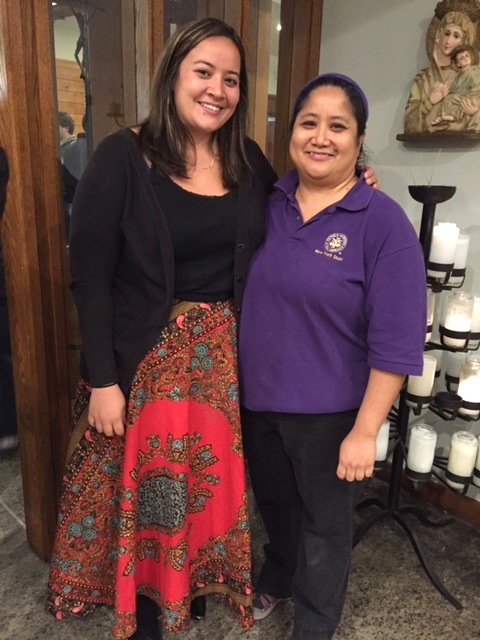Peru Central Graduate Using Her Skills to Assist African Women
 Melissa LaReau with her mother, Shirley LaReau-Kemp, after speaking to parishioners at St. Augustine’s Church, Peru, NY. Photo and Story by Mike Langlois.
Melissa LaReau with her mother, Shirley LaReau-Kemp, after speaking to parishioners at St. Augustine’s Church, Peru, NY. Photo and Story by Mike Langlois.
Psychology researchers describe happiness as a combination of life satisfaction and having more positive emotions than negative emotions. Melissa LaReau believes happiness is following your inner voice and pursuing life’s passions.
LaReau, a 2003 graduate of Peru High School and aspiring entrepreneur, recently talked to St. Augustine Church parishioners in Peru, New York. She described her role in creating Unfold Uganda, a business designed to help impoverished East African women.
LaReau’s twelve-year journey began after graduating high school. She attended Hartwick College, Oneonta, where she received a bachelor’s in science and economics. She taught English as a Second Language for a brief time for the Oneonta school district. LaReau then attended Texas A&M and graduated with a master’s in international affairs. Her first foray into the business world was an entry-level economist’s position with Ernst & Young, a multinational professional services company.
“This is exactly not what I want to be doing,” said LaReau, on her first impression of the corporate world. “I told myself three years and then I have to leave this job. I have to find something that I am more passionate about.”
Two-and-a-half years later, LaReau remembered the promise she had made to herself and listened to that inner voice. While scanning the online want ads for photo gigs – she had always dabbled in photography – an interesting item popped-up. The position was a fellowship working for a microfinance company which required basic computer and photography skills. The company was the Maryland-based Women’s Microfinance Initiative. The job was an operations position in the company’s Uganda, Africa, office.
WMI’s mission, according to the company’s website, is to establish village-level loan hubs, administered by local women, to provide capital, training and support services to rural women in the lowest income brackets in East Africa so that they can engage in income producing activities.
“I can do that job,” recalled LaReau. “I work in international economics, and I wrote my undergrad thesis on microfinance for my economics degree.”
The subsequent interview and hiring process moved quickly. Within a few weeks, she was in Uganda acting as the company’s only American employee. The decision meant giving-up a substantial salary with benefits, and collecting only a few hundred dollars per month.
When LaReau submitted a financial report a few months later, WMI’s treasurer knew the company didn’t have an average employee in the East African district.
“She (the treasurer) said we didn’t know the extent of your skills and experience,” said LaReau. “You look like a forensic accountant with the spreadsheet work you are doing.”
WMI asked LaReau to create and implement a finance system for the company’s East African loan-hubs. The district included Uganda, Kenya and Tanzania. “This was very different from a fellowship doing operations,” she said. “I was now the East Africa finance director.”
Microfinance companies offer high-quality, affordable financial services to low-income people. Typically, these clients live in rural areas and are sustained by trading crops or locally made goods. Women in third world countries constitute a majority of the borrowers. In Uganda, LaReau worked with a staff of twenty local women who cultivated and sold tomatoes.
“We would give training in business planning, marketing, sales, and saving and investing money,” she explained. “The women were given one hundred dollars over six months. You can spend one hundred dollars in two minutes (in the U.S.). It’s a very small amount, but it’s life-changing for them.”
WMI’s business plan was to make the East African district financially sustainable and pull its operations within ten years. LaReau, who was hired seven years into the program, now had three years to reach the company’s goal. She trained a few top performing staff members who were able to successfully continue WMI’s business plan.
Although LaReau’s contract with WMI was nearing an end, she hoped to continue her work with the East African women. She became good friends with Lydia Neumbe, the daughter of WMI’s Uganda director. The two women decided to start their own business selling African made goods to an international market. The company would utilize the trade skills of the East African women to produce fashionable women’s wallets using local textiles. LaReau has since relocated to Washington, D.C., to raise venture capital, and Neumbe remains in her native country to set-up the company’s operations. LaReau said they decided to name the company Unfold.
“You can unfold a wallet,” she explained. “We’re also unfolding peace, hope, and opportunity (for the Uganda women and their families). We are naming the company here Unfold Uganda,” she added. “If we move to other countries, then we will name it Unfold (for that country).”
LaReau said that Unfold Uganda hopes to add education credits, health care benefits, and begin an apprenticeship program for its employees and their families. “The main goal is to put the profits back into Uganda and create sustainable jobs,” she said. “If we give them the skills and the business training, then they can pass that along to their own children.”
For more information on Unfold Uganda visit:
Website: www.discoverunfold.com
Email:info@discoverunfold.com
Twitter: @discoverunfold
Instagram: @discoverunfold
Facebook: https.//m.facebook.com/discoverunfold
Kickstarter: https://www.kickstarter.com/projects/1010431239/unfold-wallets-that-empower/description
Posted: December 13th, 2015 under Business News, Education News, General News, Northern NY News, Peru News, Peru resident news/accomplishments, Peru School News, Religious News.
